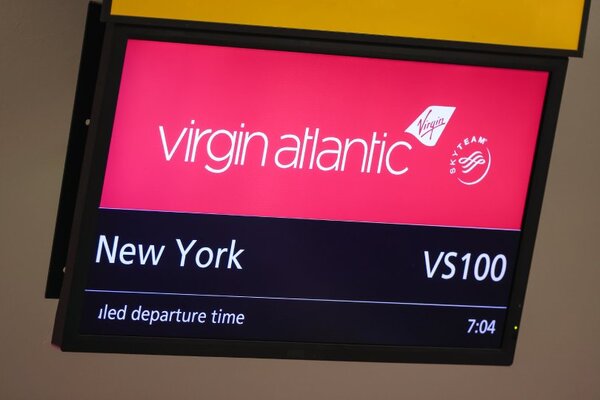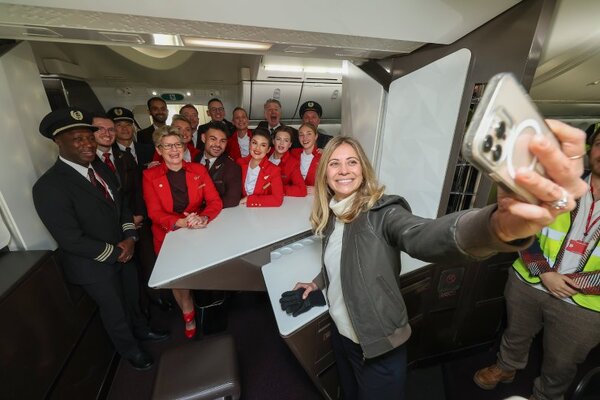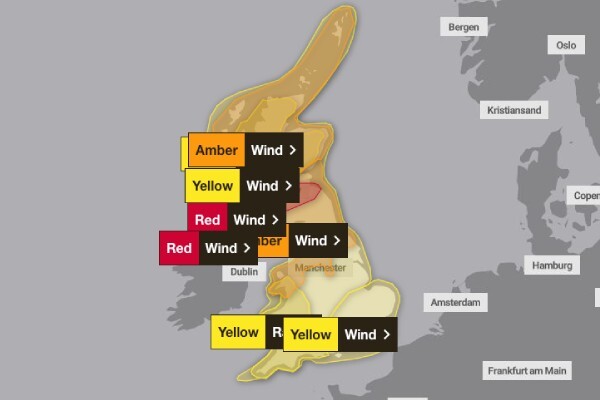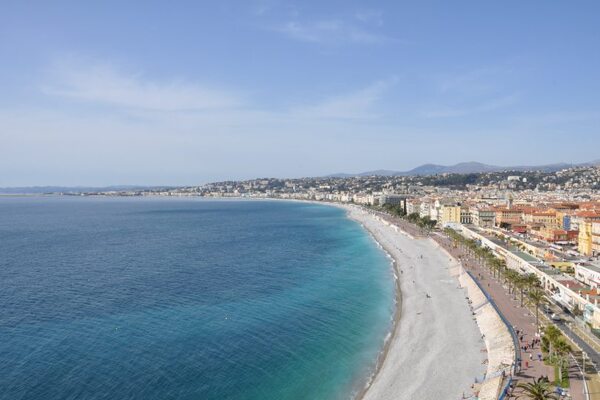Flying into the history books with Virgin Atlantic onboard Flight 100
Anyone in New York who cast their eyes skywards at just the right moment late last month might have seen a white Boeing 787 with scarlet engines make a routine and inconspicuous final approach – for them, it was probably just another flight to JFK; for those inside the cabin, it was a momentous occasion.
Virgin Atlantic flight VS100 or Flight 100 – the first long-haul flight to be powered fully by sustainable aviation fuel (SAF) – touched down safely at New York JFK on 28 November without incident.
VS100 was given the green light in early November. It was not the first 100% SAF flight; what made this a world-first was flying long-haul with SAF powering both engines, not just one as has been achieved onboard commercial short-haul flights in the past.
Compared with a typical Heathrow-JFK service, the reduction in lifecycle greenhouse gas emissions from flights like VS100 is expected to be around 70%.
Virgin Atlantic won a Department for Transport (DfT) competition last year to execute the first 100% SAF-powered transatlantic flight within a year. It led a consortium, which included Rolls Royce, Boeing, academics and consultants, and settled on a 28 November departure.
SAF is not without its problems; concerns have been raised about how expensive it is – purchasing SAF currently costs airlines up to four times as much as conventional jet fuel – and how quickly production can be scaled up.
It’s estimated that just 0.1% of the fuel being used by airlines is SAF. For Virgin to achieve its target of “10% SAF by 2030”, chief executive Shai Weiss and his colleagues highlight the need to scale up production by 150 times the current rate.
The UK government, for its part, has consulted on the introduction of a SAF mandate requiring at least 10% of jet fuel to be made from sustainable sources by 2030 – a target that may not even be achievable if there is no further investment in production and supply. Transport secretary Mark Harper has also warned the necessity for a general election sometime in the next 12 months could also hinder the government’s SAF timetable.
There are other challenges too. Sceptics and outright critics assert these fuels are not truly net-zero in terms of emissions as they are made from waste products that have previously produced carbon through their production or use.
’A seminal moment’
For Corneel Koster, Virgin’s chief customer and operating officer, SAF is a clear step towards making long-haul aviation more sustainable. “We can – and need to – fly on 100% SAF," he says.
"When it comes to long-haul aviation, electrification won’t work for many decades to come, and hydrogen is still in initial stages. If you want to fit hydrogen on a plane, your fuel tanks will need to be three times larger than they are currently.
"Mostly for the here and now, and possibly all the way to 2040 or 2050, SAF is the way to reduce the impact of long-haul aviation and start decarbonising."
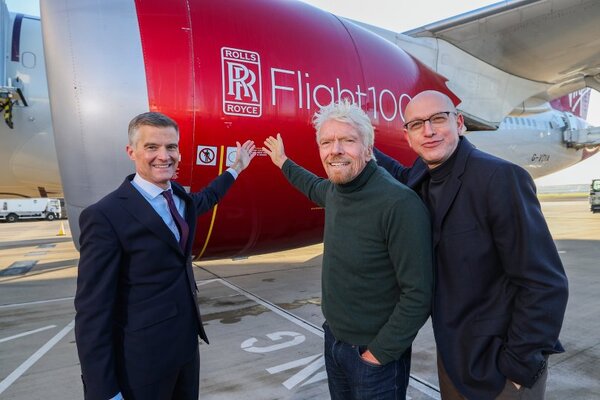
Luke Ervine, Virgin’s head of sustainability, agrees, pointing to SAF’s role as a “drop-in solution”, one that can be utilised as airlines do conventional jet fuel without requiring costly and time-consuming engine modifications.
"To be able to fill up with 100% SAF and really showcase the ability of that particular fuel, and to act as a drop-in solution without having to modify engines or change any of the fuel infrastructure, is key," he explains. "We need something that is a replacement for fossil. It’s not the silver bullet, but it is a seminal moment."
Ervine continues: “As well as greenhouse gas reductions, there’s also non-CO2 reductions. We’ve got SAF onboard that, if you look at the particulate emissions – and we’ve also done some lab tests as well – and compare them to fossil, there’s about 60% to 70% fewer particulate emissions."
But professor Alastair Blanshard, director and sustainable aviation lead at consultancy ICF, flags to the need for all potential emission-reducing technologies to be embraced and supported in aviation's journey to decarbonisation.
"It’s important that SAF, hydrogen or electric are not seen to be competing with each other," says Blanshard. "You actually need a lot of hydrogen to make SAF. Developing hydrogen makes more SAF and vice versa so they’re supporting each other.”
Supply and demand
The long-term security of SAF production, and the support required from government to kick start it, is something Virgin Atlantic, and others, has touted as a potential barrier – and that's putting it mildly.
"VS100 was always about proving from a technical perspective there is no barriers," says Ervine. "The big challenge for us is the availability and price of fuel, and making sure from a value chain perspective we’re getting the government to help us with policy to look at things like giving investors the assurance they need.
"There’s always going to be an additional cost, but the quicker you can scale an industry, the more cost-efficient it becomes. We’re working with our corporate partners to help spread that cost. The scaling will help bring the cost down, but it will be higher in the short-term.”
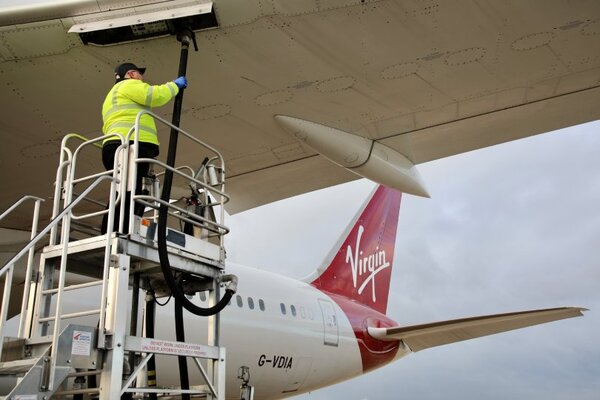
Virgin Atlantic has secured an offtake contract – an arrangement between a producer and a buyer to purchase or sell portions of the producer's upcoming goods – with Gevo for 10 million US gallons of SAF over a seven-year period through its partner and minority shareholder Delta.
The airline also carries out spot offtakes, but Ervine stresses “there is so little of this [SAF] available so we’ve had a couple of years where we’ve taken very small amounts into Heathrow". He does, however, reveal Virgin Atlantic has some memorandums of understanding with "some interesting partners to signal intent”.
Blanshard, though, points to the disparity between mandating SAF consumption in aviation and certainty of investment. “A mandate tells me you have to buy something, but it doesn’t tell me how much you have to pay for it, and that’s a really important distinction," he cautions.
"There’s a lot of risk around not only someone buying it, but paying a good price for it. It’s not money that’s the most useful thing for government, it’s certainty."
Progress, not perfection
Blanshard and his team are responsible for completing a groundbreaking end-to-end lifecycle analysis of Flight 100. The assessment will seek to account for all emissions associated with the flight, primarily those within Virgin Atlantic’s control, such as in-flight catering and waste.
"When you look across the supply chain, a lot of the data is not connected – the catering and waste management," he says. "There’s an element of saying, we need drive that focus on emissions all the way up the supply chain to get a better understanding of where those emissions are coming from.”
He is enthusiastic about the "exciting" challenges around SAF production and pricing. "“Go back a decade and the challenge was, 'is it safe?'," he reasons. "It’s taken two decades of work to get to this point. That’s a really big win.”
Addressing the sceptics, he asserts: "We’re trying to reduce emissions, and we have a choice here between progress and perfection. We can go for the perfect solution, but it will be expensive and difficult to scale. We’ll be doing something at such a small scale and at such a high price that we’ll just have very little impact.
"No one is sitting here saying, let’s use cooking oil forever. It’s a finite resource, but the one we’ve got today, so we need to make the best use of what we’ve got."
Flight 100 (VS100): everything you need to know
- The fuel: a blend of 88% hydro-processed esters and fatty acids (HEFA) consisting of used cooking oil and waste animal fat, and 12% synthetic aromatic kerosene (SAK) produced by US manufacturer Virent made of dextrose feedstock derived from waste corn
- The aircraft: a Boeing 787-9 Dreamliner with capacity of 264 passenger seats
- The amount of SAF used in-flight: approximately 45 tonnes (70 tonnes, including testing)
- Those on board: 110 passengers, including crew, Virgin Atlantic and consortium representatives, government personnel, and media
- Fuel transportation: Virent fuel was shipped from Wisconsin in the US to the UK, while Air BP volumes were shipped from the EU. But owing to time, Virent SAF was flown in for engine testing and rehearsal flight
Sign up for weekday travel news and analysis straight to your inbox

Sarah Dennis
Supplier Directory
Find contacts for 260+ travel suppliers. Type name, company or destination.
